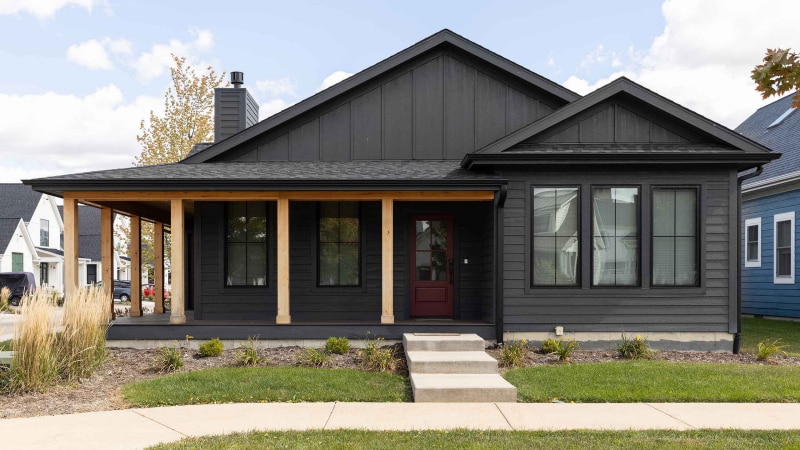The homebuying timeline

Buying your first home is an exciting experience. You're going to own a piece of property where you can kick up your feet at the end of each day. But during the period between when you first decide you're going to pursue homeownership to the minute the paperwork is signed, you have a lot of tasks to complete.
We know that buying a home can be stressful. But it doesn't have to be. You just need to be prepared. From securing your mortgage to picking out that perfect house you can call home, this is the homebuying process timeline every first-time homeowner can expect to complete.
Homebuyer first steps
Remember the old adage: Rome wasn't built in a day? Before you put your key into your new front door, you must complete some basic steps. These are the things you should be thinking about months before you contact a real estate agent.
Establish your credit score
Your credit score is the golden gateway to homeownership. Of course, your credit score isn't the only thing that lenders look at. They also look at income, debts and your financial situation as a whole. But when lenders are considering giving you a mortgage, they’ll put a heavy emphasis on your FICO score. This three-digit number is your credit score and helps lenders understand your past history with creditors. The higher the score, the more history you have as a reliable and responsible borrower.
The better your credit score is, the more likely you are to be approved for a loan. Typically, the higher your credit score the more likely you’ll qualify with most major lenders, but your results may vary from institution to institution. Higher credit scores usually result in lower mortgage payments and lower interest.
Credit scores fall into a range, here’s how to understand what your credit score means:
- 300 - 579: Poor
- 580 - 669: Fair
- 670 - 739: Good
- 740 - 799: Very Good
- 800 - 850: Excellent
If you have a lower score, you should begin improving it prior to borrowing from a lender. Not only will this help increase your overall chances of approval, but it can also lower your interest rate so you will pay less over the course of your loan.
Luckily, there are plenty of ways to help boost your credit score before you take out a mortgage. For starters, you should check your credit score—which is generated by the three major credit bureaus: Experian, TransUnion, and Equifax.
Once you figure out your credit score and credit history, you should identify any areas of credit weakness. These may be past due payments, defaulted debts, forgotten utility bills or even a lack of overall credit history. From here, you want to start working toward paying off your debts. Two common methods for paying off debt are the snowball and avalanche.
- Snowball: This method involves making the minimum payments on all of your debts and using leftover funds to pay off the smallest debts first. The goal is to feel an overall sense of accomplishment for successfully paying off debts in full and using that confidence as mental leverage to continue to pay off debts.
- Avalanche: This method involves making the minimum payments on all of your debts and using any leftover funds to pay off debts with the highest interest rates first. The goal is to minimize the overall amount of money you have to pay creditors by reducing high-interest debts as soon as possible.
If you have a low credit score due to little-to-no credit history, you can start by taking out a credit card and working your way towards a credit line that you can regularly utilize to build up history.
Work out your budget
Figuring out how much house you can afford isn't always easy. Almost all lenders leverage the DTI ratio (or debt-to-income ratio) to determine if you're eligible for a mortgage—and how much mortgage you can afford. This ratio compares your total monthly debts (e.g., credit card payments, car payments, etc.) to your pre-tax income.
For example, if you make $4,000 per month and you have $1,000 in car payments and credit card debt each month, your DTI is 25%. Each lender will likely have a maximum DTI limit.
Of course, how much of a mortgage you take out also depends on your specific needs. You don't want to borrow more than you can afford to pay back. To get a better idea of exactly how much a house is going to cost you, it's a good idea to set a budget upfront. To do this, calculate all the costs that go into purchasing a home and include them in your final budget. Remember, there are costs outside of your monthly payments to budget for when you purchase a home.
For starters, you'll have to save for a down payment. Depending on the type of mortgage you choose, the down payment can be anywhere between 3% to 20% of the overall cost of the home, depending on the type of loan you choose. Then, you have to figure in the additional costs that come with buying a home. These include:
- Home appraisal fee
- Credit report fees from lenders
- Home inspection fees
- Application fees
- Origination fees
- Closing costs
- Earnest money
- Title insurance
- Additional inspections
These are some of the costs that you should include in your calculation.
Research lenders and real estate agents
To buy a home, you need two people in your court: a lender and a real estate agent. Your lender is the financial muscle that gives you the ability to purchase a home. Your real estate agent is the person who will help you find the right home in the right location and at the right price. To put it lightly, these two entities are critical assets that will help you find, finance and close on your home.
For starters, you want to find the right lender. Often, homebuyers will use their existing bank to secure a mortgage. However, it may make sense to look at multiple lenders to find the one with the best interest rates and support systems. By finding your lender first, you can identify any issues you need to correct and get guidance on the overall amount you can comfortably spend on a home.
Once you have a price range, you can start looking for real estate agents. The best place to start is with your existing network. Do you have friends or family that can recommend a trustworthy real estate agent? Did a coworker recently purchase a home? If you can't find anyone in your social circle that’s had recent experience with a real estate agent, try reading reviews online.
During the real estate agent selection process, it's perfectly acceptable (and highly recommended) to interview a few real estate agents before making your choice. You may want to look for a real estate agent who is a member of a national trade association such as the National Association of Realtors (NAR)Opens overlay, which sets ethical guidelines for real estate agents. In addition, there are certifications that you can look for, such as ABR (Accredited Buyer's Representative)Opens overlay and CRS (Certified Residential Specialist)Opens overlay accreditations.
Finding the right home
Now we're officially in the wonderful shopping phase of the homebuying process. By this point, you should have a budget, a lender and a real estate agent. Now it's time to figure out what kind of home you “need” and what kind of home you “want.”
What type of home do you want?
There's a home out there for everyone. As a first-time homeowner, you probably have dreams, visions and goals for your future home. You may be looking for a wide-open plain so you can live off the land in the Midwest. Or you might be the type that wants to snuggle up in a neighborhood with a coffee shop right down the street in rainy downtown Seattle. Luckily, there's a home that fits that description out there, and you're about to go hunting for it.
It's your job to figure out what you want. Your real estate agent is going to ask you some important questions so they can help you find homes that fit, but it's a good idea to come prepared. The more information you give your real estate agent, the more likely the homes you're shown will fit your needs.
Here are some questions to get you started:
- Do you want to live in the suburbs, country or city?
- What size home do you want?
- How many bedrooms and bathrooms do you want?
- Is there a certain architectural style that you prefer (e.g., cottage, older home or modern)?
- Are there neighborhoods in the area that you prefer or that are close to amenities you love and use?
- What school district do you want to be within?
- Are there any specific amenity or utility needs that you have?
- What size yard do you want?
A good real estate agent should be able to take your desires, combine them with your budget and find you a few homes to look at. We highly recommend making a list of “must-haves” and “wants.” For example, you “must-have” a two-bedroom, two-bathroom home that is within commuting distance from your work. You “want” a pool, an island bar and those fancy gargoyles perched outside of the front door.
Sometimes, you can't find everything you want in the right area. By splitting up your list, you give your real estate agent a bit of breathing room which opens up more homes to look at. It's far better to visit 16 homes that all fit your needs than to visit 1 home that fits both your wants and your needs. Don't be too vague, but you also don't want to completely restrict your options. After all, you may find an awesome home that you didn't even know you wanted…until you saw it.
The house shopping process
It's time to go shopping! Now, the timeline on house shopping isn't set in stone. If you're looking at homes in an in-demand area, there may be a lot of competition. In this case, your “buying a house timeline” may move from a few weeks to a few months. During this period, your real estate agent will bring you to homes that match your “must-haves” (and hopefully include your “wants”).
Be prepared. You may view a bunch of houses before that certain one screams “this is the one!”
Making an offer
Once you find the right home, you and your real estate agent will put in an offer. Sometimes, your offer is outbid by another buyer who’s also looking at the home. Other times, your offer is accepted within a day or two and you're on the fast track to homeownership. It all depends on the competitive nature of the area, the other buyers interested in the home and the seller's overall appetite for closing.
In a seller's market (i.e., a highly competitive market where the seller has the upper hand), you may find that your offer gets negotiated. In that case, it will be up to you if you want to increase your bid. Remember, don't get caught in a bidding war and go outside the range you pre-established. In a buyer's market (i.e., a less competitive market where the buyer has the upper hand), your offer may be accepted almost immediately.
Taking care of the final details
Once your offer has been accepted, it's time to nail the final few details that stand between you and your future home.
Getting your loan approved
The length of time it takes to fully secure your mortgage loan depends on your lender. Most closing dates are about 30 to 60 days after you've made an offer on the home. This allows time for getting full approval for your mortgage loan, fixing any issues uncovered during the home inspection and making any changes based on your final walk through.
Getting an appraisal
While you're waiting for your loan to be approved, it's time to make sure your future home is priced properly. Your lender will send an appraiser to the home. This is a hands-free process and your only job is to wait. If the home's value is at or higher than the price you're paying, you're in the clear. However, if it's substantially lower, you may have to renegotiate the deal with the seller. The appraisal process helps protect both you and the lender. You don’t want to overpay for the house, and your lender wants to make sure the house is worth the value of the mortgage. It’s always a good idea to make sure your contract includes a clause that the value must be at least the sale price to avoid a larger down payment.
Having the house inspected
A home inspection is different from a home appraisal. The inspection process involves having a certified inspector come out to the house to look for any unforeseen issues with the home. This could be something as simple as some unnoticed aesthetic damage, to more serious issues such as structural problems or hidden water damage. Unlike an appraisal, it’s your responsibility to obtain an inspection as the lender is not involved.
There are other types of inspections that you can opt for, such as dedicated roofing inspections, sewer inspections and termite inspections. But these aren't always provided by traditional home inspectors. You may need to hire specialized inspectors for this.
Closing the deal
It's finally here! The day you've been waiting for. It's time to close the deal. After filling out some paperwork and getting the keys, you're in the clear. You own a home. Now it's time to start the moving process.
Are you ready to buy your first house?
If you’re ready to take that first step to homeownership, we have plenty of helpful resources and calculators for soon-to-be homeowners. You can read this detailed breakdown of how mortgages work or find out if you are preapproved for a home mortgage. Speak to one of our Home Lending Advisors today and we'll help you find a mortgage for when you find your perfect home.



